GENERAL ENGLISH COURSES
LEVEL A1 – ELEMENTARY
Level A1 represents the basic level of general language use, meaning the lowest point at which simple linguistic interaction can be envisaged.
Students will be in a position to handle simple questions about themselves (address, acquaintances, jobs, hobbies and leisure activities and so on). Students will be able to understand and make use of basic everyday expressions. Interaction will still remain limited to simple scenarios on condition that the interlocutor speaks slowly and succinctly and repetition may be required at times.
COURSE CONTENT
Listening
• Comprehend basic everyday greetings
• Comprehend simple, slow standard speech
• Comprehend numbers, times and prices
• Comprehend simple, basic discourse corresponding to a concrete need
Reading
• Comprehend simple, short texts and instructions (notices or posters)
• Comprehend basic descriptions (brochure, leaflet)
• Comprehend basic details in a simple e mail or postcard
Speaking
• Interact on a very basic level in simple social situations with pauses and repetition
• Introduce themselves or others in a simple but clear manner
• Ask and respond to basic questions about everyday life
• Describe their home in simple detail
• Describe their family or people they know in simple detail
• Describe their job in simple detail
• Describe their habits and everyday routine in simple detail
Writing
• Write short and simple sentences with the help of a dictionary
• Write short and simple e mails or postcards
• Complete simple forms providing personal details (hotel check in, register on a course)
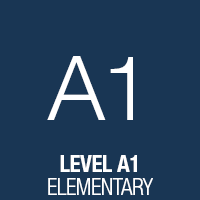
Your Profile
• You are more or less a beginner or are just about to start out in English
• You are ready for a fun and exciting life changing challenge
What’s hot
• Quality, experienced trainers
• Dynamic atmosphere
• Contextualised communicative training
• Full student interaction in small groups
• Best updated resources and material available on the market
• Personal face to face progress tutorial
GENERAL ENGLISH COURSES
LEVEL A2 – PRE-INTERMEDIATE
At A2 level students have a good comprehension of set sentences and common everyday expressions connected to areas of most immediate relevance (e.g. basic personal and family details, shopping, professional and leisure activities).
They can communicate in simple and routine situations where a simple and direct exchange of information based on familiar and routine matters is required. Students will begin to function in basic social situations in which they will be able to use simple and basic common polite forms of greeting and address, greeting people and asking how they are and reacting to their news. They will have the tools to deal with situations of relatively basic and short social interaction such as asking and responding to questions about their professional and leisure activities, in addition to making plans, making and accepting offers and accepting and refusing invitations. They will also be able to manage basic interaction in situations in shops, post offices, banks and similar services, requesting information, booking tickets and following instructions. Finally, students will be able to give and follow simple directions.
COURSE CONTENT
Listening
• Comprehend standard everyday greetings
• Comprehend slow standard speech (personal information, jobs, hobbies)
• Comprehend main points in clear, simple messages and announcements
• Identify main, predictable points in TV news and broadcasts
• Understand basic questions used in shops and services
• Understand simple instructions and directions
Reading
• Comprehend simple, short texts and instructions with everyday lexis or international expressions
• Comprehend basic descriptions (brochure, leaflet)
• Comprehend specific details in a basic letter or e-mail
• Comprehend information on menus and timetables
• Find general information on leaflets, brochures or in simple advertisements
• Comprehend simple and short newspaper articles based on familiar topics
Speaking
• Interact in social situations requiring simple and direct exchange of information
• Use everyday greetings
• Introduce themselves or others
• Ask and respond to questions about everyday life and news
• Make and respond to invitations and offers, plans of action and arrangements
• Make everyday transactions in shops, banks and offices
• Request and give directions and basic instructions
• Narrate a simple story and describe personal experience
Writing
• Write short and simple sentences with the help of a dictionary
• Write short and simple e mails or postcards
• Complete simple forms providing personal details (hotel check in, register on a course)
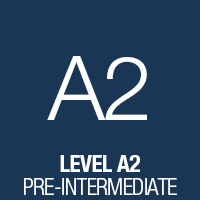
Your Profile
• You have elementary knowledge in written and oral English and you want to improve your level
• You are ready for a fun and exciting life changing challenge
What’s hot
• Quality, experienced trainers
• Dynamic atmosphere
• Contextualised communicative training
• Full student interaction in small groups
• Best updated resources and material available on the market
• Personal face to face progress tutorial
GENERAL ENGLISH COURSES
LEVEL B1 – INTERMEDIATE
Level B1 represents a definite Intermediate level where students will have the ability to maintain constant interaction and transmit their ideas clearly in a variety of areas, whilst also being able to follow the main points of a more elaborate or complex discussion around them.
This is based on the assumption that the interlocutor expresses himself in a clear and standard manner. Much as there will be only minor hindrance at times in comprehensive expression, the student may invariably need to pause so as to take repair or grammatical or lexical planning into account. This will certainly apply to longer and more complex tasks of output production. The student will be in a position to express himself with clarity and in a coherent and connected fashion in situations which are less routine yet retain personal interest (specific incidents whilst travelling or dealing with intermediaries for a service). Additionally, students will be able to handle contexts where they will have to engage in conversations on a more unprepared and autonomous basis on familiar topics, such as situations at work, at home, at school or during their leisure time. Students will be in a position to describe hopes and dreams for the future, express wishes for the present and for the future, describe personal experience or events and begin to speak more autonomously about personal perspectives and intentions. It will also be possible for students to narrate a story in the past or outline the plot of a film or a book, whilst conveying their own reactions.
COURSE CONTENT
Listening
• Comprehend main points about familiar situations (study, work, home, leisure activities)
• Comprehend general details in broadcast or recorded material about everyday situations
• Comprehend basic and simple presentation on familiar topics (shopping, hobbies)
• Comprehend short and simple messages and announcements.
Reading
• Comprehend main facts in letters, e mails, letters, brochures, magazines and articles
• Comprehend main details in basic information sources (online web page, short official texts)
• Skim and scan material on timetables and leaflets for certain information
• Make predictions about what will happen next in a text or deduce meaning from titles
• Comprehend supporting details for main ideas in a text
• Paraphrase the main points in a text.
Speaking
• Communicate in basic social situations
• Initiate, maintain and close a conversation
• Express and respond to basic suggestions, advice, opinions and feelings
• Deal with invitations and refusals
• Ask for other speaker’s opinion
• Check and confirm other speaker’s understanding
• Express agreement and disagreement
• Give and follow instructions and directions
• Deal with everyday bookings, orders and appointments
• Deliver a short,basic presentation and deal with question
• Interrupt a conversation
• Change topics during a conversation
• Narrate a story.
Speaking
• Write basic formal and informal letters and emails (thanking,apologising, accepting, refusing, giving and requesting information)
• Write short,factual descriptions
• Write stories
• Write basic yet structured argumentative essays and articles.
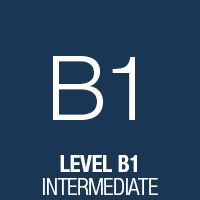
Your Profile
• You have intermediate level in written and oral English and you want to improve your English
• You are ready for a fun and exciting life changing challenge
What’s hot
• Quality, experienced trainers
• Dynamic atmosphere
• Contextualised communicative training
• Full student interaction in small groups
• Best updated resources and material available on the market
• Personal face to face progress tutorial
GENERAL ENGLISH COURSES
LEVEL B2 – UPPER-INTERMEDIATE
At B2 level students move on to explaining,justifying and sustaining opinions and perspectives.
For instance, they will be able to elaborate their standpoints on a given issue, defending a structured and supported opinion, developing a balanced for and against discourse or identifying an issue, providing suggestions for improvement and discussing hypothetical outcomes. Hence, they will be in a position to participate in both formal and informal discussions based on topics that are familiar to them in a wide range of areas. They will be able to fully interact in social situations when the spoken language is standard. There will be no difficulty in initiating, maintaining and ending a conversation appropriately with relative fluency and autonomy, even when engaging in conversation with native speakers. Students will enjoy having the possibility to comprehend the main ideas of more complex texts based on both concrete and abstract themes related to their centres of interest. In addition, students will have a greater control over their language and will be able to identify and correct many of their own mistakes when speaking and writing.
COURSE CONTENT
Listening
• Comprehend information about familiar situations (study,work, home, leisure activities)
• Comprehend general and specific details in broadcast or recorded material
• Comprehend basic technical information in an instructions manual
• Make predictions based on what has been heard
• Listen for general gist or detail
• Deduce meaning of unknown words through contextualisation
• Listen and take down notes.
Reading
• Comprehend main facts in letters, e mails, letters, brochures, magazines and articles
• Skim and scan material for certain information
• Comprehend basic technical information in an instructions manual
• Read adapted novels
• Make predictions about what will happen next in a text
• Comprehend more abstract descriptions of hopes, dreams, wishes and emotion.
Speaking
• Communicate in social situations
• Initiate, maintain and close a conversation
• Express and respond to suggestions, advice and opinions
• Offer developed and structured personal perspectives
• Express personal reactions to trips, books and films
• Ask for other speaker’s opinion
• Check and confirm other speaker’s understanding
• Express agreement and disagreement
• Give clear instructions
• Link ideas in correct sequence
• Deal with everyday telephone calls
• Deliver a clear, structured presentation and deal with questions
• Interrupt a conversation
• Change topics during a conversation
• Narrate a story.
Writing
• Write formal and informal letters and emails
• Review a film, book or restaurant
• Write opinion essays and articles
• Write stories
• Write short reports of suggestion
• Proofread and edit texts.
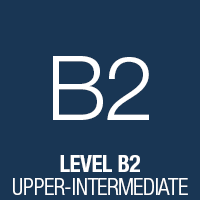
Your Profile
• You have upper-intermediate level in written and oral English and you want to improve your English
• You are ready for a fun and exciting life changing challenge
What’s hot
• Quality, experienced trainers
• Dynamic atmosphere
• Contextualised communicative training
• Full student interaction in small groups
• Best updated resources and material available on the market
• Personal face to face progress tutorial
GENERAL ENGLISH COURSES
LEVEL C1 – ADVANCED
At C1 level, students will be able to make effective use of a highly extensive lexical range which enables spontaneous and autonomous fluent communication at an advanced level.
The smooth and fluent flow of communication might only be hindered at times, when dealing with a particularly unknown or unfamiliar topic. In such cases, students should still be able to use circumlocution as they will have developed the necessary skills which enable them to gain time whilst thinking about the details that they would like to convey. Generally speaking, students will know how to manage clear and cohesive productive output that is connected in a logical and fluent manner showing full control over their speech. C1 students will be able to face the challenges of dealing with longer and more complex tasks and still be aware of inference or implicit meaning. They will fully comprehend the difference between formal and informal contexts and will be able to adapt their skills for academic, professional and social purposes, making use of appropriate organisational patterns, linkers and cohesive devices.
COURSE CONTENT
Listening
• Fully comprehend specific points about familiar situations (study, work, home, leisure activities)
• Fully comprehend specific details in broadcast or recorded material about everyday, academic and professional situations
• Fully comprehend details in lectures, talks and discussions, even those outside their centres of interest
• Follow films and broadcasts with ease
• Comprehend native speaker accents at native speaker speed
• Comprehend implied and inferred meaning
• Comprehend discourse including idioms and colloquialisms.
Reading
• Fully comprehend factual, academic and professional material (letters, e mails, letters, brochures, magazines and articles)
• Fully appreciate main details in official information sources (online web page, official texts)
• Skim and scan material for specific information
• Fully comprehend sub themes and supporting details in a text
• Paraphrase and synthesise the main points in a text
• Fully appreciate differences in tone and register.
Speaking
• Communicate in all social, academic and professional situations with fluency
• Express detailed, supported opinion and respond to suggestions, advice and feelings
• Convey shades of opinion
• Deal with persuasive and tentative concessions
• Contribute to ongoing discussions even those outside centres of interest
• Deliver a lengthy, structured presentation and deal with questions
• Describe complex topics even those outside centres of interest
• Respond to counter arguments and hypothesise
• Develop ordered arguments and integrate sub themes
• Incorporate a wide range of collocations and colloquialism
• Eliminate false friends whilst speaking
• Provide convincing conclusions.
Writing
• Write formal and informal letters and e mails with a full appreciation of tone and register
• Write detailed and factual descriptions, reports and proposals, articles and essays
• Convey shades of opinion and hypothesise
• Convey varying degrees of probability, certainty and doubt
• Write reviews of films, books, places and services
• Fully synthesise, paraphrase and evaluate information
• Eliminate false friends whilst writing
• Make full use of proof reading and editing skills.
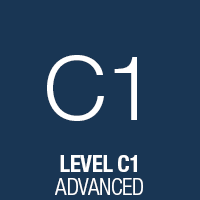
Your Profile
• You have advanced level in written and oral English and you want to improve your English
• You are ready for a fun and exciting life changing challenge
What’s hot
• Quality, experienced trainers
• Dynamic atmosphere
• Contextualised communicative training
• Full student interaction in small groups
• Best updated resources and material available on the market
• Personal face to face progress tutorial

